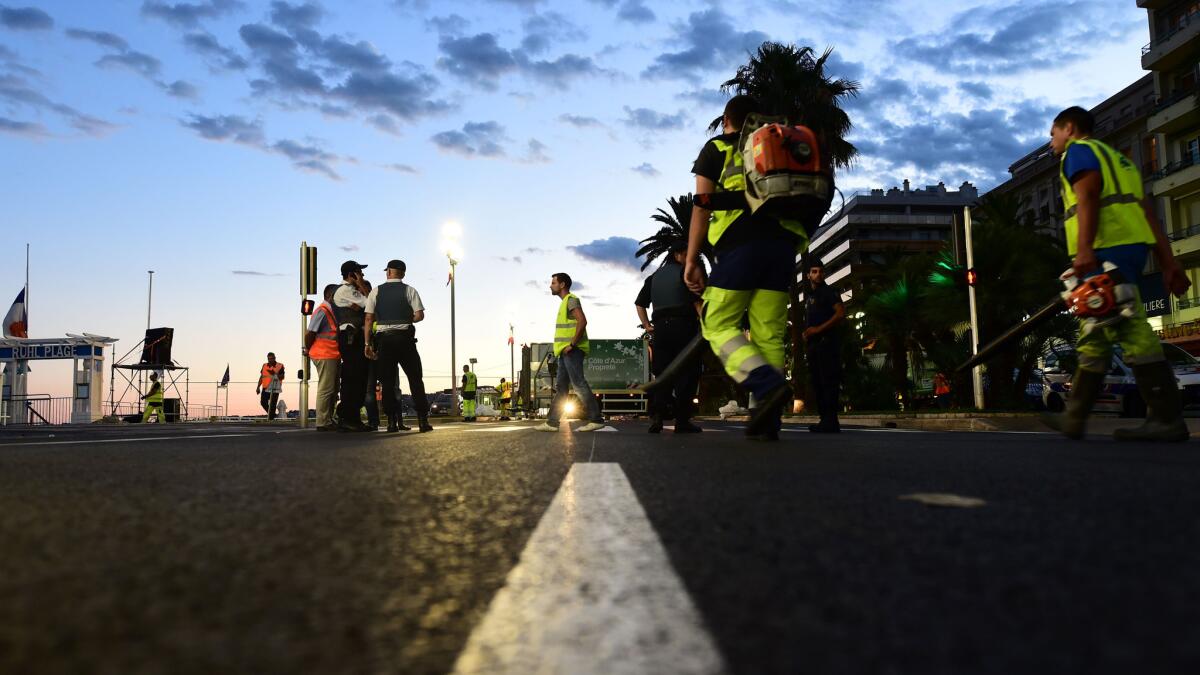Nice: far more than a playgroud for the Euro elite

As she walked along the promenade above the ocean, past the horror-scape of broken bodies, Maryam Violet could hear the cries and murmurs of the hurt and grieving — in Arabic.
One family had lost a mother. They called her a martyr.
“There were so many Muslim people who were victims because I could see they had scarves over their head,” Violet, who was vacationing in the seaside resort city, told the Guardian.
That numerous Muslims reportedly were among the scores killed when a truck driver plowed into a crowd watching Bastille Day fireworks on the Promenade des Anglais came as little surprise to those familiar with this French Riviera town. Long known as a playground for Europe’s elite, with its pebbly beaches and aquamarine waters, Nice is a diverse, multicultural city with a large population of North Africans from former French colonies like Tunisia, Algeria and Morocco.
On Friday, French authorities identified the driver of the deadly truck driver as a Tunisian-born deliveryman named Mohamed Lahouaiej Bouhlel, who had permission to live in France and stayed in a modest apartment in Nice.
But despite its diversity, Nice — the fifth largest city in France -- remains largely segregated along ethnic lines. Like other French cities, it has struggled to assimilate growing migrant populations, particularly Muslim immigrants from North Africa.
In Nice — an ancient city of some 343,000 people — elderly millionaires favor the Mont Boron neighborhood, known as the Beverly Hills of Nice, as well as the palm-tree-lined Carre d’Or quarter. The city’s center is inhabited by middle-class teachers, hotel staffers and office workers, while Western expats and tourists flock to Old Town.
The scene of the attack, the crescent-shaped, seafront Promenade des Anglais — the Walkway of the English — itself dates back to 1822, and is named for the aristocratic English families who flocked to the temperate Mediterranean city and built the wide walkway, which is lined with historic hotels and outdoor cafes.
Meanwhile, many working-class minority residents live in isolated neighborhoods of towering apartment buildings, and state-funded housing projects sprawling inland.
The neighborhoods supply a share of ready young minds on which local jihadist recruiters prey.
— The Economist
Bouhlel, a known petty criminal who was fatally shot by police after slicing through the holiday crowds in the truck, resided in a crowded, high-rise concrete apartment complex — a scene far removed from the sea-hugging promenade where he carried out his attack.
“The neighborhoods supply a share of ready young minds on which local jihadist recruiters prey,” the Economist wrote.
In the wake of the Paris attacks, many homes in the city were raided by police under anti-terrorism laws.
Last year, two teenage boys were taken off a departing plane at the Nice airport after authorities were alerted that they were headed for jihad, according to the Economist.
And last month, a waitress of Tunisian descent working in a central Nice cafe reported that she was harassed in Arabic and assaulted by two men for serving alcohol on the first day of Ramadan.
Eric Ciotti, a lawmaker for the region that includes Nice, responded angrily, telling The Telegraph newspaper: “This attack should be placed in a national context that has seen a constant rise in religious fundamentalism and ghettoized communities.”
Special correspondent Harvey reported from Nice and Times staff writer Branson-Potts from Los Angeles.
ALSO
Family frantic to find UC Berkeley student missing in terrorist attack in Nice, France
Editorial: Grasping at straw men in the wake of the Nice massacre
Truck rampage in Nice raises painful questions: How many terror attacks can France withstand?
More to Read
Sign up for Essential California
The most important California stories and recommendations in your inbox every morning.
You may occasionally receive promotional content from the Los Angeles Times.











